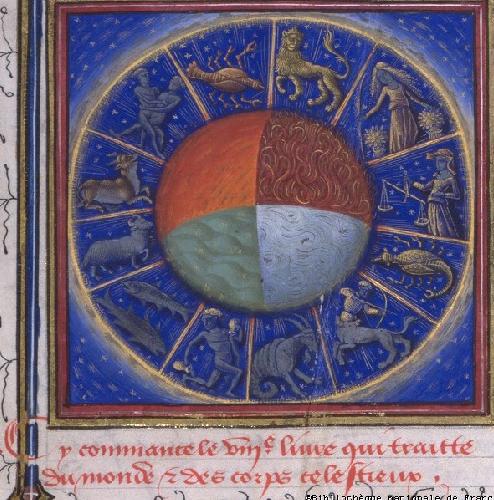MEDIEVAL EXPLANATIONS FOR PLAGUE
To medieval thinking, the cause of the Black Death or Plague had many sources. It was seen as a medical event, astrological disaster, or a sign of God's wrath. All these interpretations were offered at the same time and without contradiction.
49 medical masters at the University of Paris wrote the most famous treatise on the causes of the Plague, the Paris Consilium, in October 1348 at the request of King Philip VI of France. It said that the ultimate cause of the Plague would never be known - that the truth was beyond human understanding. It gave several possibilities:
The celestial cause was the result of the conjunction of Saturn, Jupiter, and Mars, under the sign of Aquarius that took place in 1345, following solar and lunar eclipses. The Paris Consilium cited Aristotle's notion that the conjunction of Saturn and Jupiter bring disaster. To Albert the Great, the conjunction of Jupiter and Mars bring Plague.
The terrestrial cause was air poisoned from gases released during earthquakes. When the poisoned air entered the body, it went to the heart - considered, in medieval times, the organ of respiration - and then contaminated the body's vital spirit and caused its organs to rot.
There was also the presence of ideas taken from ancient doctors. The Hippocratic text Epidemics stressed the importance of astrology in medical practice. Aristotle's Meteorology was also influential because it discussed weather, comets and meteors, earthquakes, and especially putrefaction - the process seen by medieval thinkers as the nature of illness, especially fevers. Also used by the Parisian Doctors was The Canon of the Persian physician Avicenna, which describes the nature of pestilential fever.
The earliest known tractate is the Regimen of the Catalan physician Jaume d'Agramunt written in 1348 to be read to the common people. Jaume pointed out that the Plague killed indiscriminately, destroying master and servant. He cited Deuteronomy 24, in which God promised prosperity to those who keep his commandments, and Plague to those who do not. He noted other Biblical passages, which state that Plague is also a punishment of the sin of pride.
Others concluded that society itself had caused the Plague by its sinful behaviour. The Plague was caused by the wickedness of humanity.
Another Medieval Christian understanding of the Black Death was the Book of Revelation and its notion of the Four Horsemen of the Apocalypse - pestilence, war, famine and death.Others, finally, blamed lepers, poors, Arabs and Jews for bringing the Plague in Europe.
